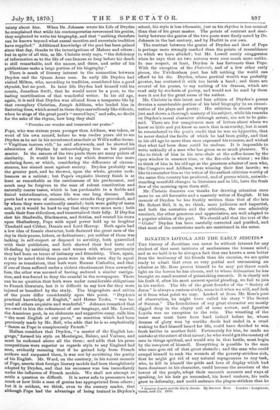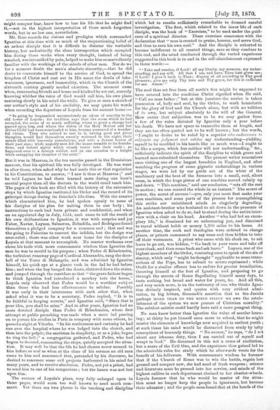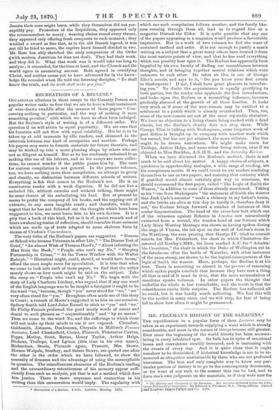ius Loyda and the Early Jesuits.
IGNATIUS LOYOLA AND THE EARLY JESUITS.* THE history of Jesuitism can never be without interest for any student of that most intricate of mechanisms the human mind ; and as we hold it to be always a fact that one knows a man better from the testimony of his friends than his enemies, we are quite ready to admit that even so very partial and unreasoning an admirer as Mr. Rose proves himself to be may yet throw much light on the heroes he has chosen, and to whose delineation he has brought no small amount of painstaking research. It is clearly not his fault if, after his most earnest special pleading, we fail to join in his verdict. The life of the great founder of the " Society of Jesus" is always a curious study, come to it when we will, and look at it from what point we may. Looked at from Mr. Rose's post of observation, he might have called his story " The Secret of Success." The foundations of any great character are mostly digged deep in the clayey soil of some sorrow, and Ignatius Loyola was no exception to the rule. The wrestling of the inner man must have been hard indeed before he, whose dreams of glory won by warlike deeds had ended in a cruel waking to find himself lamed for life, could have decided to win fresh battles in another field. Fortunately for him, he made no mistake at the outset of that career; he who would get the mastery of men in things spiritual, and would win in that battle, must begin by the conquest of himself. Everything is possible to the man who once gets rid of that great obstacle ; and the man who could compel himself to suck the wounds of the poverty-stricken sick, that he might get rid of any natural repngnances to any task, who, to kill in himself the pride and love of display which had been dominant in his character, could become the associate of the lowest of the people, adopt their uncouth manners and ways of speaking, let his hair go uncombed, his beard unshorn, his nails grow to deformity, and could embrace the plague-stricken that he
By Stewart Bose. London : Longmana,
might conquer fear, knew how to lose his life that he might find it,—not in the highest interpretation of those much forgotten words, but in no low one, nevertheless.
Mr. Rose records the visions and prodigies which surrounded Ignatius at this time with so much of the unquestioning belief of an ardent disciple that it is difficult to disinter the veritable history, but undoubtedly the close introspection which occupied him during those weeks when every thought, instead of being numbed, was intensified by pain, helped to make him so marvellously familiar with the workings of the minds of other men. Nor do we for a moment doubt the man's absolute sincerity,—tbat he did desire to consecrate himself to the service of God, to spread the kingdom of Christ and cast out in His name the devils of luke- warmness, ignorance, and immorality, which in the Church of the sixteenth century greatly needed exorcism. The moment came when, renouncing friends and home and kindred he set out, scarcely knowing whither the voice of God would call him, his own plans maturing slowly in his mind the while. To give at once a sketch of our author's style and of his credulity, we may quote his words when recording the departure of Loyola from his ancient home :— " In going he bequeathed unconsciously an odour of sanctity to the • old tower of Loyola ; for tradition says that the room which he had -occupied, the scene of so much suffering, where so great a change had -passed upon him, and where the vision of the Holy Mother and her -divine Child had been vouchsafed to him, became possessed of a wonder- ful virtue. They who retired to rest in it having good and pious thoughts, would find themselves sweetly wakened in the night, their minds filled with heavenly consolations, and with a devout horror of their past sins ; while ungodly men felt the house tremble to its founda- tions, and beheld sights which struck terror into their souls ; as happened once to a foreign soldier, and on one occasion to a knight -while occupying the chamber of the saint."
But it was in Manresa, in the ten months passed in the Dominican convent, that his spiritual life was fully developed. He was wont in after times, when asked why he had made this or that regulation in his Constitutions, to answer, "I saw it thus at Alanresa ;" and he told Laynez he had there learned more during one hour's mental prayer than all the doctors in the world could teach him. The pages of this book are filled with the history of the successive steps by which Ignatius instituted his Order and the record of its principal doings during its founder's life-time. With the reserve -which characterized him, he had spoken openly to none of his disciples of his plan for uniting them in one body ; his instructions to each had been private and confidential, and when -on an appointed day in July, 1534, each came to tell the result of his own deliberations to Ignatius, it was with surprise and joy Faber, Xavier, Laynez, Salmeron, Bobadilla, and Rodriguez found theme-elves a pledged company for a common end ; that end was the going to Palestine to convert the infidels, but the design was .over-ruled; there was other work near home for the disciples of Loyola at that moment to accomplish. No master workman ever -chose his tools with more consummate wisdom than Ignatius the men he was to mould to his purpose ; when Pedro di Ribadeneira, the turbulent runaway page of Cardinal Alessandro, rang the door- bell of the Torre di Melangelo, and was admitted by Ignatius himself, his quick eye at a glance took in the lad he had before him ; and when the boy banged the doors, clattered down the stairs, and jumped through the corridors so that "the grave fathers began to think Ignatius had introduced a monkey into the house," Loyola only observed that Pedro would be a worthier subject than those who had less effervescence to subdue. Possibly it was early in their intercourse with each other that, when asked what it was to be a secretary, Pedro replied, "It is to be faithful in keeping secrets," and Ignatius said, "Since that is sour idea, you shall be mine." And in after years, Ignatius had no more devoted disciple than Pedro di Ribadeneira, whose first attempt at public preaching was made when a mere lad passing on to pursue his studies in Paris in company with some others, he passed a night at Viterbo. "In his restlessness and curiosity he had run over the hospital where he was lodged into the church, and then into the pulpit; the sacristan in simplicity, or as a joke, began to ring the bell ;" a congregation gathered, and Pedro, who had begun to descend, remounting the steps, quietly accepted the situa- tion. It may well be that the life he had chosen never seemed to him before so real as when at the close of his sermon an old man came to him and announced that, persuaded by his discourse, he desired to renounce some evil projects harboured in his mind for many years, and to receive absolution. Pedro, not yet a priest, had to send him to one of his companions ; but the lesson was not lost upon him.
The success of Loyola's plans, very fully enlarged upon in these pages, would seem too well known to need much com- ment. Yet there are two phases in the teaching and discipline
which led to results sufficiently remarkable to demand careful investigation, The first, which related to the inner life of each disciple, was the book of "Exercises," to be used under the guid- ance of a spiritual director. These exercises commence with the declaration that "man is created to praise, honour, and serve God, and thus to save his own soul." And the disciple is exhorted to become indifferent to all created things, save as they conduce to this end, and the mind conducted through the varied experience suggested in this book is to end in the self-abandonment expressed in these words:—
" Take and receive, 0 Lord ! all my liberty, my memory, my under- standing, and my will. All that I am, and have, Thou hest given me; 0 Lord! I give it back to Thee ; dispose of all according to Thy good pleasure; give me only Thy love and Thy grace, for this is sufficient for me. Amen.'" The soul thus set free from all earth's ties might be supposed to have entered into the condition Christ signified when He said, "Call no man father ;" but at this juncture the novice is taken possession of, body and soul, by the Order, to work henceforth for the glory of God and the Church alone, but with no volition of its own, but subject absolutely to the will of the General. How entire that subjection was to be we may gather from a few of the rules dictated by Ignatius only a year before his death. We have not space to transcribe them at length, and they are too often quoted not to be well known ; but the words, "I ought to desire to be ruled by a superior who endeavours to subjugate my judgment and subdue my understanding—yielding myself to be moulded in his hands like so much wax—I ought to be like a corpse, which has neither will nor understanding," &c., sufficiently indicate the spirit of the discipline to which grave and learned men submitted themselves. The present writer remembers once visiting one of the largest foundries in England, and after watching the progress of some gigantic undertakings in various stages, we were led by our guide out of the whirr of the machinery and the heat of the furnaces into a small, cool, silent room, in which the huge piston of one machine moved calmly up and down. "This machine," said our conductor, "sets all the rest in motion ; we can control the whole in an instant." The secret of power, the secret of success !—yes, only you must first make your men machines, and some parts of the process for accomplishing this strike our uninitiated minds as singularly degrading. An assistant-brother who hesitated to sit down in the presence of Ignatius when asked to do so, had to stand during the entire inter- view with a chair on his head. Another "who had led an exem- plary life," is dismissed for an unbecoming jest, and dismissed to travel without habit or money 1,200 miles to his home. At another time, the cook and theologian were ordered to change places, or priests summoned to say mass and then bidden to take off their vestments. A priest who came with his cloak on, to ask leave to go out, was bidden, " Go back to your room and take off your cloak, and then come back and ask leave." Laynez, one of the highest members of the Order, venturing once to speak of the sin of simony, which only "might bethought" applicable to some trans- actions of the Pope, has to submit to severe reprimand ; while Otelli for a similar offence has to endure far greater humiliation, throwing himself at the feet of Ignatius, and proposing to go through the streets of Rome flagellating himself many days, to taste nothing but bread and water for years, &c. And all this, and very much more, is on the testimony of one who thinks Igna- tius divinely inspired, and quotes with very evident admi- ration, in big letters, Sismondi's assertion that to the Jesuits perhaps MORE THAN TO THE BIBLE ITSELF we owe the estab- lishment of the system we now possess of Christian morality." The subtlest satirist could hardly have said a more pungent thing.
No man knew better than Ignatins the value of secular learn- ing; at thirty he put himself once more to school, that he might master the elements of knowledge now acquired in earliest youth ; at such times his mind would be distracted from study by lofty conceptions of heavenly things. "No sooner," he says, "do I set about any irksome duty, than I am carried out of myself and wrapt in God." He discerned in this not a cause of exaltation, but a snare of the Evil One, and the experience thus gained led to the admirable rules for study which he afterwards wrote for the benefit of his followers. With consummate wisdom he foresaw that if the Church of Rome was to win the battle, regain lost ground and conquer new, she had need of fresh weapons ; science and literature must be pressed into her service, and minds of the highest calibre in each department chained to her chariot-wheels. Loyola foresaw that he who would be master of the situa- tion must no longer keep the people in ignorance, but become their educator ; and the people soon found that at the hands of the
Jesuits their sons might learn, while they themselves did not per- ceptibly pay. Promoters of the Inquisition, they appeared only the recommenders to mercy ; weaving chains round every throne, they appeared only offering fresh conquests to each monarch ; they wielded a sword so fine that, as in the old Danish legend, it was slot till he tried to move, the captive knew himself divided in two. Mr. Rose has ably sketched the early companions of the Order (with modern Jesuitism he does not deal). They had their work, and they did it. What that work was it would take too long to analyze ; it succeeded, for the time at least, and the Church and the world agree in canonizing success. Both agreed in crucifying Christ, and neither seems yet to have advanced far in the know- ledge He revealed when He told the listening disciples, "Ye shall know the truth, and the truth shall make you free."
































 Previous page
Previous page